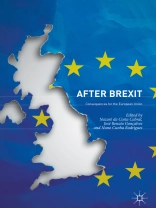This topical and important book identifies the short to medium-term economic, financial and social consequences of Brexit. Containing perspectives from leading thinkers across legal, economic and financial fields, it considers both the general effect of UK withdrawal on the European integration process, and the specific impact on the free movement of capital, goods and people.
Addressing the main areas within both the UK and the EU that can and will be affected by Brexit, including the financial sector, immigration, social rights and social security, After Brexit: Consequences for the European Union will make fascinating reading for all those currently engaged in the study and practice of Law, Economics, Finance, Political Science, Philosophy, History and International Affairs.
Inhaltsverzeichnis
Chapter 1. Introduction.- Part 1. Brexit’s General Effects: The Future of the European Integration Process.- Chapter 2. Brexit: Origins and Future Perspectives.- Chapter 3. The Brexit and the European Union in the Context of Globalization.- Chapter 4. Brexit and the Future of the EU: Move-Back or Move-Forward?.- Chapter 5. Brexit and the Risk of the European Desintegration.- Chapter 6. A Qualitative Change in the Process of European Integration.- Chapter 7. Brexit and the Reform of Economic and Monetary Union.- Chapter 8. Brexit as an Exceptional Change of Circumstance?.- Part 2. Brexit’s Sectorial Effects (I): Trade and Free Movement of Goods and Citizens.- Chapter 9. Which Model for Brexit?.- Chapter 10. Economic Implications of Alternative Trade Relationships: Post-Brexit Options for the UK.- Chapter 11. The Position of EU Citizens in the UK and of the UK Citizens in the EU27 Post-Brexit: Between Law and Political Constitutionalism.- Chapter 12. Post-Brexit Models and Migration Policies: Possible Citizenship and Welfare Implications for EU Nationals in the UK.- Chapter 13. New Forms of Social Security for Persons Moving Between the EU and the UK?.- Part 3. Brexit’s Sectorial Effects (II): Free Movement of Capital and the Financial Markets.- Chapter 14. Free Movement of Capital and Brexit.- Chapter 15. Free Movement of Capital: Could the CJEU Smooth Brexit?.- Chapter 16. Policy Uncertainty and Spillovers into International Financial Markets.- Chapter 17. EU Financial Markets after Brexit.- Chapter 18. How Brexit may Affect Banks’ Business Models and the Financial System in the UK and EU: Opportunity to Revitalize the Existing Banking Structures?.
Über den Autor
Nazaré da Costa Cabral is Associate Professor at the University of Lisbon Law School, Portugal, and principal researcher of the Center for European, Economic, Fiscal and Tax Law Research (CIDEEFF) at the same university. Cabral is Vice-President of the journal Revista de Finanças Públicas e Direito Fiscal (Public Finances and Tax Law Journal), published by IDEFF and Almedina Editors. She is author of several books, articles and working papers, and her research areas are mainly on Public Finance, Public Budgeting, Economic and Monetary Union, and Social Security.
José Renato Gonçalves is Professor at the University of Lisbon Law School, Portugal. His teaching and research activities focus on European Union Law, Economic and Monetary Union, Financial and Monetary Regulation and Supervision, International Economic Law, Development Studies, Public Finance, Access to Information and Data Protection.
Nuno Cunha Rodrigues is Professor at the University of Lisbon Law School, Portugal. He has published several articles and books, namely in his area of expertise which lies with EU law, Economic law, Competition Law, Public procurement and Public Finance. He joined the research group on Globalization, Economic Integration and Development: European and Lusophone Perspectives and the group on Crisis, Public Policies, Taxation Policies and the Euro as a member. Vice-President of the European Institute, he holds a ‚Jean Monnet module‘ granted by the European Commission (2015–2018).












